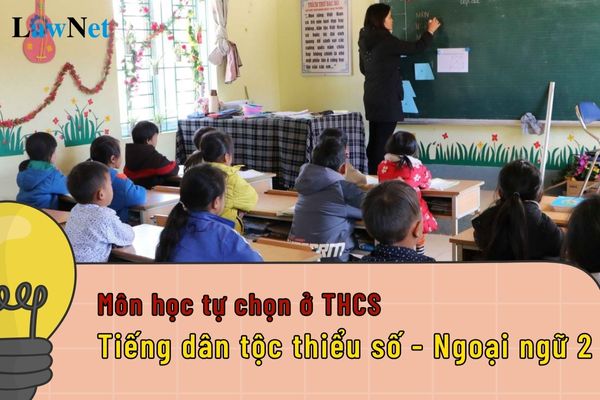What are optional subjects in lower secondary education in Vietnam?
What are optional subjects in lower secondary education in Vietnam?
Pursuant to Section 1.2 Part 4 of Circular 32/2018/TT-BGDDT (amended and supplemented by Clause 1 Article 1 of Circular 13/2022/TT-BGDDT):
Career-oriented phase
...
Lower secondary education
a) Educational content
Compulsory subjects and educational activities: Literature; Mathematics; Foreign Language 1; Civic Education; History and Geography; Natural Sciences; Technology; Informatics; Physical Education; Arts (Music, Fine Arts); Experiential Activities, Career Orientation; Local Educational Content.
Optional subjects: Ethnic Minority Language, Foreign Language 2.
...
Thus, according to the aforementioned regulations, there are (2) optional subjects which are Ethnic Minority Language and Foreign Language 2.
Download to view details of the Appendix issued with Circular 32/2018/TT-BGDDT
What is the duration of optional subjects at lower secondary education in Vietnam?
According to Section 1.2 Part 4 of Circular 32/2018/TT-BGDDT on the general education program issued by the Minister of Education and Training (amended by Article 2 and Article 1 of Circular 13/2022/TT-BGDDT):
Career-oriented phase
...
1.2. Lower secondary education
a) Educational content
Compulsory subjects and educational activities: Literature; Mathematics; Foreign Language 1; Civic Education; History and Geography; Natural Sciences; Technology; Informatics; Physical Education; Arts (Music, Fine Arts); Experiential Activities, Career Orientation; Local Educational Content.
Optional subjects: Ethnic Minority Language, Foreign Language 2.
b) Duration
Each school day consists of one session, with no more than 5 periods per session; each period lasts 45 minutes. Middle schools with sufficient conditions are encouraged to implement two sessions per day according to the guidance of the Ministry of Education and Training.
...


Thus, the duration of option subjects at lower secondary education is as follows:
+ Ethnic Minority Language: Grade 6-7-8-9, 105 periods per school year.
+ Foreign Language 2: Grade 6-7-8-9, 105 periods per school year.

What are optional subjects in lower secondary education in Vietnam? (Image from the Internet)
What is the educational roadmap for lower secondary education in Vietnam according to each phase?
According to Article 2 of Circular 32/2018/TT-BGDDT, the general education program is implemented according to the following roadmap:
- From the school year 2020-2021 for Grade 1.
- From the school year 2021-2022 for Grade 2 and Grade 6.
- From the school year 2022-2023 for Grade 3, Grade 7 and Grade 10.
- From the school year 2023-2024 for Grade 4, Grade 8 and Grade 11.
- From the school year 2024-2025 for Grade 5, Grade 9 and Grade 12.
What are regulations on conducting the assessment of educational results of lower secondary education in Vietnam?
Pursuant to Subsection 2 Section 6 of Circular 32/2018/TT-BGDDT (amended by Clause 1 Article 1 of Circular 13/2022/TT-BGDDT):
- The objective of educational result assessment is to provide accurate, prompt, and valuable information about the extent to which students meet the program’s requirements and their progress to guide learning activities, adjust teaching activities, manage and develop programs, ensure each student's progress and improve educational quality.
- The basis for assessment is the required qualities and competencies as stipulated in the overall program and subject-specific programs and educational activities.
- The assessment scope includes compulsory subjects and educational activities, elective subjects, and selected learning modules. The assessment targets are the products and learning processes, and training of the students.
- Educational results are assessed using both qualitative and quantitative methods through regular and periodic evaluations at educational institutions, national, local wide-scale assessments, and international assessments.
- Alongside the results of compulsory subjects and educational activities, elective subjects, and selected learning modules, the results of elective subjects are used for the overall assessment of students' learning results for each school year and throughout the learning process.
- Regular assessments are organized by the subject teachers, combining teacher assessments, assessments by students' parents, self-assessment by the students being assessed, and assessments by other students.
- Periodic assessments are organized by educational institutions to serve the management of teaching activities, ensure quality at educational institutions, and serve program development.
- National and local wide-scale assessments are organized by national or provincial/municipal exam organizations to serve the management of teaching activities, ensure the quality of educational result assessments at educational institutions, serve program development and improve the quality of education.
- Assessment methods ensure reliability, objectivity, suitable for each age group, each educational level, do not put pressure on students, and limit the costs for the state budget, students’ families, and society.
- Gradually introduce achievements in measurement science, assessment in education, and international experiences into improving the quality of educational result assessments, student classification at educational institutions, and use wide-scale assessment results as tools for quality control of assessments at educational institutions.
Download to view details of the Appendix issued with Circular 32/2018/TT-BGDDT

